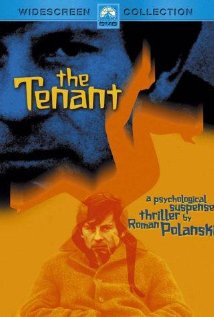
THE TENANT
France, 1976, 126 minutes, Colour.
Roman Polanski, Isabelle Adjani, Shelley Winters, Melvyn Douglas, Jo Van Fleet, Claude Pieplu.
Directed by Roman Polanski.
The Tenant is not an entertainment. Rather it is a Roman Polanski cinematic study of identity, environment, hostility and suicidal madness. Set in a dingy Paris apartment with Melvyn Douglas, Shelley Winters, Jo Van Fleet, amongst others, as sinister neighbours, the film focuses on a sympathetic young man, played excellently by Polanski himself, who rents a room and becomes possessed by it and the memory of its previous tenant and her suicide. The first half offers a coherent plot, but in the second there are conscious gaps in the development so that we are jolted along, madly, towards a bizarre (even laughable) horrible ending. Expert film-making, demanding, thoughtful and alarming.
1. The overall impact of this film? Its quality as serious cinema? Audience interest, enjoyment, bafflement and fear?
2. What was the purpose of Roman PQ1anski's making this film? For himself, for the audience, for what audience? What was his intention for the audience's response?
3. The build-up of the atmosphere of Paris, of the apartment building, the apartment itself, the streets and the cafes, the hospital, the work places? How did the film communicate its atmosphere? The use of colour, darkness and shadow, music?
4. The significance of the title? Its reference to the previous occupant? Its reference to he hero? One assuming the identity of the other?
5. Audience response to the ordinary start: a look at the place, the concierge, the request to see the room. the discussion about the rates. the encounter with the owner and its ordinariness. the terms of discussion, the hero leaving and going to the cafe opposite etc.?
6. How normal was the tenant at the beginning of the film? His seeking a room, his bargaining, sensitivity and timidity. shyness and gentleness, passivity?
7. How well did the film indicate hints of what was to come? The concierge and her indication of the suicide and pointing it out? The tenant's looking out the window at the broken glass, his discovery of the people standing for hours in the toilet? The noises, the hostility of the people in the apartment building?
8. The dramatic importance of the visit to the hospital? The concern of the tenant, the injuries of the dying woman? The lack of communication? Stella's visit and trying to communicate? Stella's horror at not being recognised? The agonized shout and the visuals of the mouth of the dying woman? The impact of the later news of her death? The impact on the audience, shared with the tenant?
9. How did we learn more about the tenant, his work. his relationship with Stella, his dealing with the people in the apartment? The conversations with the landlord, the suspicions of the concierge?
10. The importance of the party at home? The noisy friends and their vulgar normality? The tenant seeming to be part of this? Yet not part of it?
11. The criticism from the man upstairs? His unreasonableness and hostility? The fact that he was one who stood for hours in the toilet? The tenant is apologetic, the sequence with the garbage and taking it downstairs, its being missing when he returned?
12. How did the tenant begin to change, the effect of the room on him, the dead woman's belongings, his dreaming through his work, his becoming more and more introverted? The effect of going to the cafe for breakfast? The owner and the waiter and their attention towards the tenant? Forcing him to smoke Marlboro, cigarettes, drink cocoa etc.?
13. The overall effect of the concierge, the owner and his wife and his criticisms and threats, the widow with the spastic child and her intimations of persecution, the hostile woman who persecuted the widow? The Ran upstairs? The tenant's response to them? The jumbling of their images in his imagination? His seeing himself persecuted, as the dead woman persecuted?
14. How much normality was there in his relationship with Stella? The encounter at the funeral, returning home with her, lovemaking? How much did she help, how much did she not help him? The meaning of the relationship? His wanting to be saved?
15. The use of night settings? The mystery in the night, dreams and fantasies, noises and threats? Real people taking their place in the dreams? The dead woman taking over?
16. Audience response to the final assimilation of identity? The various steps towards it: the makeup and the return to normality, the dress, the buying of the wig? His moving in and out with the two identities? Audience response to the visual transvestite impressions?
17. The film's visual presentation of the theme of identity and loss of identity? Sexual confusion? Fears and normality?
18. Returning to Stella and what he hoped to achieve? Her helping of him and yet his suspicions, the berserk destruction of her apartment? The significance of the accident with the car and his imagining the apartment people persecuting him? The fact that he was seeing everyone as sinister?
19. How convincing was the build-up to the tenant's assuming the identity of the dead woman and repeating her death? The repetition of the death? The stunned reaction of the people? The calling of the doctor? The dying of the man and his awareness of the people in the courtyard?
20. How much was the film a parable for the modern world? The uncertainty of identity, sexuality, sanity and madness, the pressures and hostility of people? Society? A world of violence and destruction?